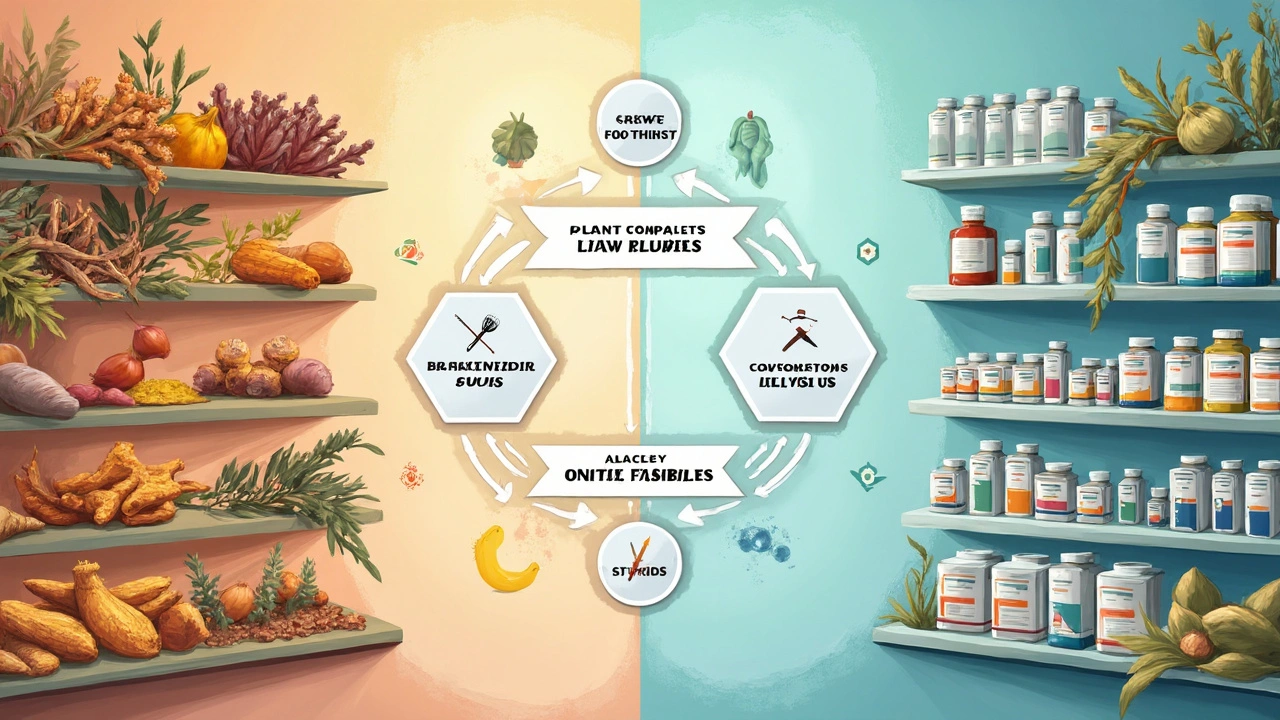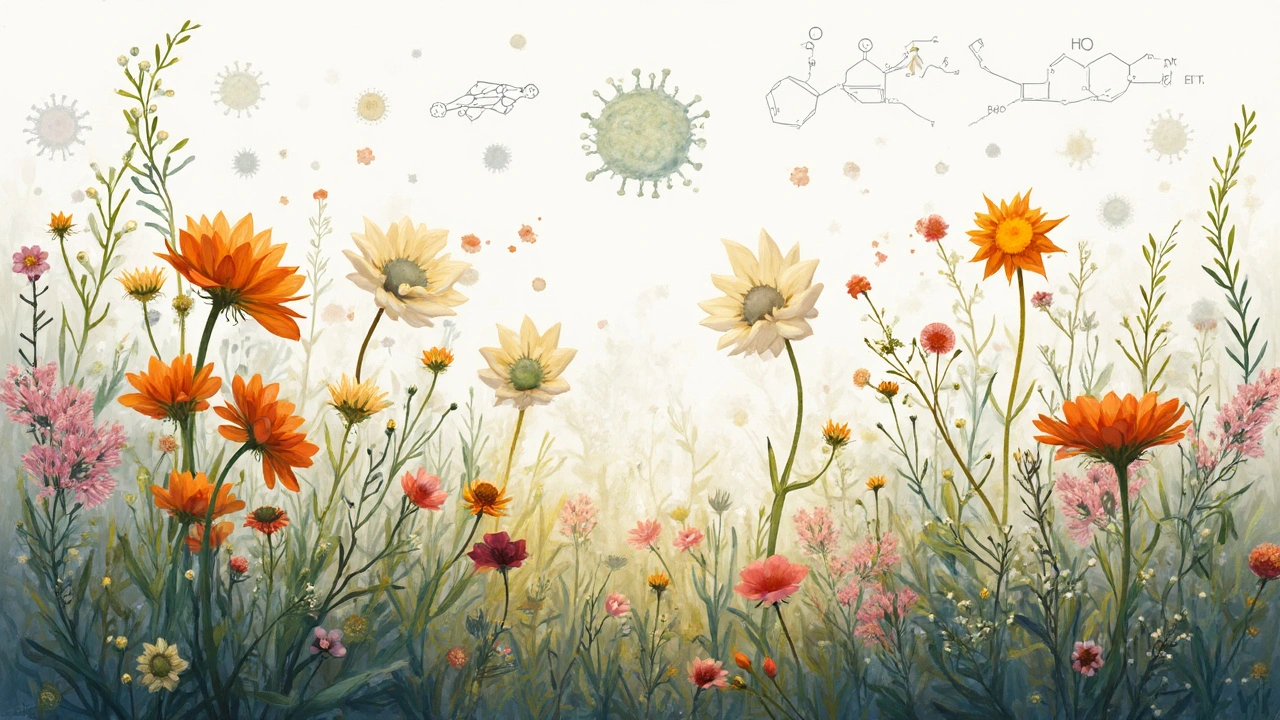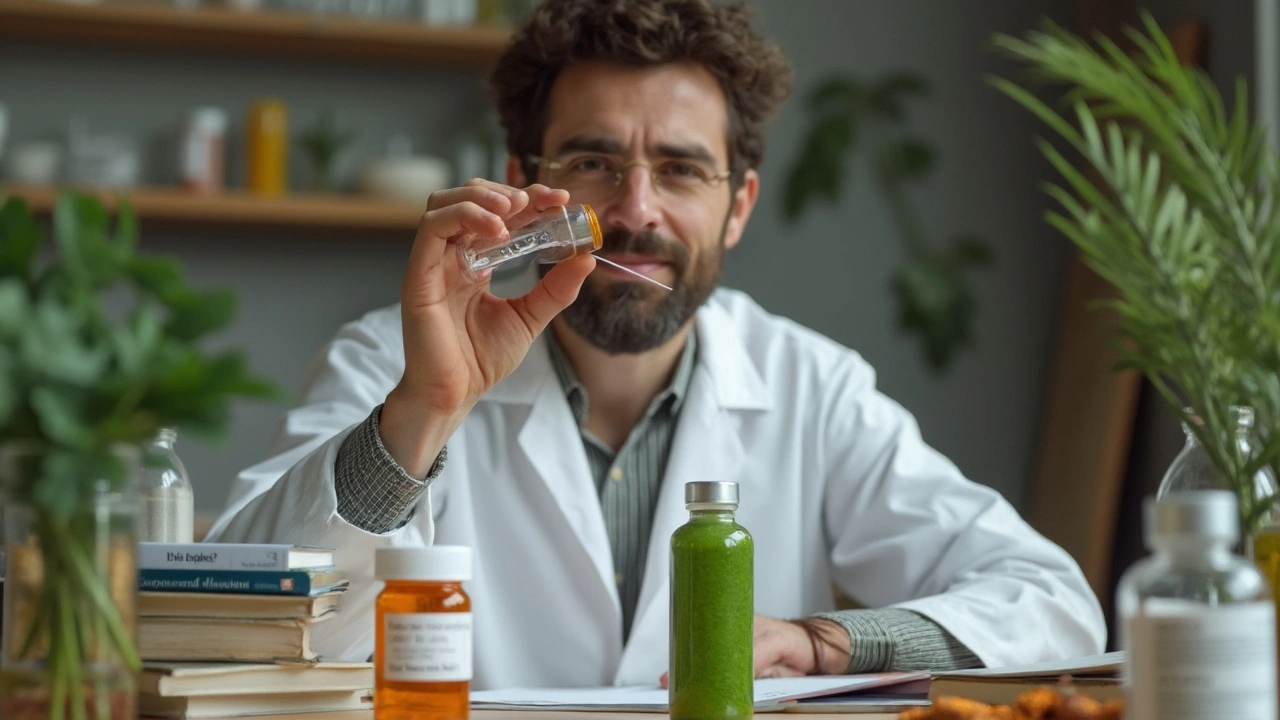When immune systems start flipping the script and attacking the body instead of defending it, lots of folks get stuck between two tough choices: keep pushing through with crippling symptoms, or swallow another round of meds with a list of side effects longer than a Brisbane summer’s day. Corticosteroids like prednisone do the job fast, but all too often, you’re swapping one kind of misery for another. No wonder so many people—my wife Diana included—keep asking if plant-based options can deliver real-life relief for autoimmune issues. The names crop up in health circles: quercetin, boswellia, curcumin—ingredients that don’t sound like medicine, but keep turning up in studies, on supplement shelves, and in kitchen cupboards. But do they actually measure up to the mighty steroid pill? Or are we chasing another trend?
Where Plants Take On Pills: The Science Of Sterols And Flavonoids
Let’s get clear on what we’re dealing with. Plant sterols and flavonoids aren’t miracle dust sprinkled by wellness gurus—they’re real compounds. Sterols act a bit like cholesterol’s gentle cousin. They’re found in nuts, seeds, and even that breakfast muesli you might have ignored. These guys tinker at the cell membrane, tamping down inflammation in sneaky, smart ways. Flavonoids, on the other hand, show up in things like onions, apples, turmeric, and even your Friday night glass of red. They're pigments and antioxidants, and some—like quercetin—pack immune-modulating skills that are still surprising researchers.
Curcumin is the superstar in turmeric, giving curries that yellow kick, but in research labs it’s caught attention for soothing inflammatory pathways—way deeper than just taste. Boswellia, dubbed Indian frankincense, is an old-school resin that’s holding up in modern studies for easing joint pain in folks with rheumatoid arthritis. And quercetin? A key flavonoid from apples and onions, it’s showing promise for calming histamine storms and quieting down hyperactive immune responses. A Japanese clinical trial in 2023 found that supplementing with 500 mg of quercetin a day reduced the frequency of lupus flare-ups without any major side effects. Consider that next time you slice an onion for dinner.
Now, compare this to corticosteroids. These drugs work by blunting your body’s entire inflammatory response. They're efficient, but their scorched-earth approach means you risk side effects: thinning bones, crazy hunger, sleepless nights, weird mood swings, and weight gain that stubbornly clings on. Studies out of the University of Queensland have tracked steroid use in autoimmune patients for years, and while flare-ups drop, risk of diabetes, cataracts, and even heart problems goes up with prolonged use. That’s not to say these meds are villains—they’re just not as gentle or targeted as we wish they were.
Out of curiosity, I dug up research from Monash University on plant sterols in autoimmune control. Turns out, beta-sitosterol (found in pistachios and avocados) lowers inflammatory markers in people with colitis, and can even protect the gut lining. This isn’t a shortcut to cure-all status, but it’s a sign that these compounds don’t just twiddle their thumbs—they shift your body’s immune responses. Scientists are seeing actual drops in CRP levels, which translates to reduced inflammation. But here’s the catch: It’s gentler, slower, and depends on your body—your gut, your genetics, your diet. No single plant fix works the same for everyone.

Practical Uses And Real-World Experiences
If you’re rolling your eyes, thinking all this sounds too hopeful, you’re not alone. I’ve watched Diana, who deals with autoimmune thyroid issues, test everything from turmeric capsules to boswellia tea. There are days when plants do the trick—cutting down swelling, making mornings easier, and bringing energy back. Other times, nothing moves the needle unless a prescription is involved. When plant-based options help, it seems to come down to consistency and stacking the right lifestyle stuff: anti-inflammatory diet, good sleep, exercise, and sometimes working alongside regular meds rather than replacing them outright.
The dosing is a stickler. Research on quercetin shows benefits at 500–1000 mg daily, but your typical apple or bowl of berries won’t cut it—you need supplements, and picking the right one is a maze. Boswellia extracts, to really make a dent, should have at least 65% boswellic acids, taken two to three times a day for steady relief. Curcumin? Studies only show clear benefits at high doses (often with piperine from black pepper added in for absorption), meaning grandma’s curry, delicious as it is, won’t get you all the way there. This isn’t about just eating ‘healthy’—it’s targeted and intentional.
What’s wild is, some autoimmune patients report being able to reduce their steroid dose when they stack these compounds—under medical guidance, obviously. A 2024 study out of Sydney had rheumatoid arthritis patients add boswellia extract to their regular med routine. One out of three reported less joint stiffness, and many managed to lower their daily steroid use over three months. It’s not proof these plants are a magic bullet, but it’s a sign they work as a powerful tag-team. The same goes for quercetin; several docs in Melbourne are now suggesting it as an adjunct for people with moderate lupus or chronic allergies—again, with careful monitoring, not wild online orders.
Some side tips if you’re thinking of giving plants a go: buy from reputable brands, always check for third-party testing, go slow with your dose, and check for interactions (especially if you take blood thinners or immune-suppressing drugs). And be patient—these compounds act slow and build up effects over weeks or even months. Keep a symptoms diary, track your progress, and don’t be shy about looping your doctor or specialist in. There’s nothing heroic about going it alone, especially when you could miss important red flags.
If you're looking to explore more on replacement options, this list of natural alternatives to Prednisone lays out the different plant-based routes others are trying, and how to weigh the potential risks and rewards. It’s worth a read if you want a down-to-earth look at what’s actually working for real people—not just theory.

Heads-Up: Expectations, Side Effects, And Smart Choices
No plant compound, no matter how promising, is going to flip an autoimmune diagnosis overnight. The science is honest about this. These natural compounds usually deliver ‘nudge’ effects rather than dramatic reversals. If you’re after steroid-level results, the hard truth is you’ll likely need a period of overlap—or at least a strategy where plants are playing the long game, not the lead role. For example, University of Sydney’s 2024 review on autoimmune therapies made it clear: while flavonoids reduce swelling and help with symptoms, serious flare-ups (like those in lupus nephritis or multiple sclerosis) almost always need prescriptions at least in the early phase.
But, compared to corticosteroids, the upsides are obvious. Side effects from plant sterols and flavonoids tend to be mild: stomach upset, rare allergic reactions, maybe a headache if you go overboard on doses. That’s worlds away from the bone-thinning, mood-bending, immune-suppressing impact of long-term steroid use. For those with mild-to-moderate autoimmune conditions, these alternatives honestly feel like unlocking a secret level—especially for people who’d rather not gamble with their long-term health just to get through the work week.
Curcumin does have a few unique tricks. It not only calms inflammation—think redness, pain, and swelling—but also seems to block specific genes that tell your immune system to go haywire. This targeting is why some researchers are so jazzed about it. Same with boswellia: the results can show in three to four weeks, and many patients notice better range in joints, less morning stiffness, even more restful sleep, probably thanks to less discomfort. But again, these gains build slowly, and if you ditch steroids too soon, you risk a rebound—never a good plan.
Smart steps? Treat plant compounds as part of your self-management toolkit. Stack them with good habits—cutting junk food, keeping stress in check, stretching, and hitting some sunshine for vitamin D. If things don’t shift in a few months, talk to your rheumatologist. And if you do see improvement, maybe you can work with your doc to gently step down your steroid dose—always slowly, always with supervision.
If you’re someone who wants control, not just another prescription, understanding exactly what these natural options can and can’t do is freeing. Science is rooting for plant sterols and flavonoids to rise up the ranks alongside pharmaceuticals, not as wishful thinking, but because the early evidence really is stacking up. Balancing hope and realism is tricky, but after watching Diana’s ups and downs, and reading far more studies than I ever thought I would, I can say this: For the first time, nature’s toolbox isn’t just a footnote—it's genuinely worth a spot in the lineup.


Comments
Alan Kogosowski
Ah, this topic is fascinating! Plant sterols and flavonoids have been studied extensively, yet many still underestimate their potential compared to synthetic corticosteroids. While corticosteroids provide rapid symptom relief by suppressing the immune system broadly, they come with a host of side effects that can't be ignored.
What's compelling about quercetin, boswellia, and curcumin is their ability to modulate inflammatory pathways more delicately. For example, curcumin inhibits NF-kB signaling, which is a pivotal conduit in chronic inflammation. But we must also consider bioavailability issues which limit their clinical efficacy unless formulated with enhanced delivery methods.
In autoimmune management, the role of these compounds could be adjunctive rather than substitutive. And while they won't replace corticosteroids overnight, their long-term safety profiles make them appealing for ongoing disease control.
However, longitudinal clinical trials comparing these phytochemicals head-to-head with corticosteroids are lacking, making definitive claims premature. Still, for patients wary of long-term steroid use, this natural option shines as a complementary approach. Curious what others think about these natural compounds vs. pharmacological interventions?
July 18, 2025 AT 07:03
Ben Lee
Totally agree! I appreciate the balanced perspective here. From what I've seen, many people want 'natural' solutions, but it's essential to remember that not everything natural is inherently safer or more effective.
I've personally tried curcumin supplements alongside my prescribed treatment, and while I noticed some improvement, it wasn't a miracle cure or a replacement. That said, lessening the steroid dosage thanks to integrative methods has been a big plus for me.
The practical use of these compounds—like ensuring proper dosage and form—is crucial. For example, boswellia is often packaged as an extract, but the concentration levels vary wildly across brands.
Little things like that make a big difference and can explain why some patients report benefit and others don’t. Has anyone else had experiences around that with supplement quality?
July 22, 2025 AT 06:53
David Brice
Look, let's not kid ourselves. While these plant compounds are interesting, their impact is marginal compared to corticosteroids. Patients need real results, not wishful thinking.
That said, I get that someone's looking for alternatives, but these natural extracts won’t do the heavy lifting for severe autoimmune conditions. They might help reduce inflammation mildly, sure, but relying on them alone could be dangerous.
Clinicians shouldn't shy away from using them as adjuncts, but please don't let misinformation convince people to skip proven treatments out of fear or false hope. It’s a slap in the face to the painstaking efforts made in modern medicine.
Anyone else worried about the glorification of 'natural cures' without robust evidence to back them? I’m all for supporting patients, but we must prioritize effectiveness and safety above all else.
July 26, 2025 AT 06:43
Zachary Schroer
Oh please, all you naysayers with your predictable skepticism, welcome to the 21st century where the green aisle doesn’t have to be a joke 😄. Seriously, using plant-based sterols and flavonoids isn’t some hippie fantasy but a scientifically grounded reality that’s just beginning to embarrass the pharmaceutical overlords with their side effects.
Corticosteroids? Basic. We have curcumin dreaming it up a storm on the molecular dance floor, boswellia shutting down inflammation like a boss, and quercetin showing the path to a less toxic life.
Probability of side effects vs. proven harm? Natural compounds win hands down. Everyone needs to open their eyes and ditch the pharmaceutical corporate propaganda already. ✌️ Anyone here ready to embrace the power of nature fully?
July 30, 2025 AT 06:33
Stacy Whitman
I'm just going to say it: We need to be super cautious when talking about replacing corticosteroids with anything less verified. This isn’t just about personal choices but public health.
Many of these so-called natural treatments have huge variability, and the FDA oversight isn't exactly robust on supplements.
People with autoimmune diseases often face serious consequences if treatments fail. It's reckless to promote plant sterols and flavonoids like they're the silver bullet. We must rely on well-tested medicine first and foremost.
That said, I’m open to integrating natural approaches as complementary, but don't mistake that for outright replacements or cures.
What safeguards are there to make sure people aren’t misled here? Are the claims backed by real data from reputable institutions?
August 3, 2025 AT 06:23
Kim and Lin
😊 I can relate to a lot of these points! In my experience, trying to balance supplement use alongside prescribed meds felt a bit like walking a tightrope.
Curcumin and boswellia definitely helped with joint pain and fatigue, but managing expectations is key. I found effective communication with my doctor essential — they helped tweak dosages and monitor risks.
What’s been helpful for me is using these natural compounds as a way to potentially reduce inflammation gradually rather than as a direct replacement for steroids. It just feels more sustainable and less scary.
And yeah, there’s a lot of supplement quality issues. Sourcing from reputable brands is a must. Have others found any reliable brands or advice on that front? 😕
August 7, 2025 AT 03:27
Kemari Nielson
The scientific basis for these compounds is strong but should always be contextualized within clinical evidence.
Plant sterols and flavonoids do provide anti-inflammatory and immunomodulatory effects, as noted in multiple peer-reviewed studies. Still, their pharmacokinetics and effective dosing range often fall short for acute conditions where corticosteroids excel.
Therefore, these natural agents seem most appropriate for maintenance phases or prevention of flare-ups rather than emergency control.
Clinicians should consider integrating these into holistic protocols, but always under specialist supervision.
More rigorous clinical trials are needed to refine their role and guidelines concerning autoimmune disease control.
August 11, 2025 AT 00:30
Steve Helsel
Honestly, I’m skeptical. Most people just sell supplements with big claims and zero outcome data. It's lazy to jump on the plant sterols hype without looking at the nuances.
Sure, they might have some mild benefits, but I bet most patients don’t experience anything close to what corticosteroids deliver. Plus long-term effects? Who knows.
Seems like an excuse for companies to profit off people desperate for alternatives. Rely on science, not fairy tales.
August 14, 2025 AT 21:33
Steve Moody
Precise when necessary, extensive when warranted — that’s how we discuss medical alternatives. The post rightly demystifies botanical compounds without succumbing to hyperbole.
What struck me was the emphasis on “what works and what doesn’t.” Too often, discussions fall into unfiltered glorification or dismissal.
I'll add that quercetin's chromone backbone and curcumin's bis-phenol structure allow for effective ROS scavenging, attributable to their multi-target mechanisms, unlike corticosteroids' blunt immunosuppression.
The question remains: where does the future lie? Adjunct therapy or standalone? The answer is still under investigation but exciting nonetheless.
Thoughts?
August 16, 2025 AT 02:43
Adrian Hernandez
Yeah, yeah, 'natural solutions'... meanwhile pharma is probably suppressing this info because it threatens their profits. Typical. 🙄
Don't you find it fishy that these plant compounds are 'just discovered' when traditional medicine has used some for centuries? Why only now a push for synthetic steroids and not natural options? Makes you wonder if there's a conspiracy.
Anyway, until proven otherwise, take it with a grain of salt. I’d bet those so-called 'natural cures' are just side gigs for supplement companies.
August 16, 2025 AT 16:37
duncan hines
I've read through everything, and frankly, I think the entire narrative about plant sterols competing with corticosteroids is overblown. It’s like comparing apples and oranges. Sure, they might have different mechanisms, but the efficacy side-by-side isn’t remotely comparable at the moment.
Also, the way some 'experts' talk up these compounds feels more like marketing than medicine. Anyone else feel like the supplement push is a multi-billion dollar hustle disguised as health advice?
I'm waiting for robust, double-blinded trials before getting excited. Until then, I'll trust what science has proven beyond anecdotal stories.
Any thoughts about the limitations of these plant compounds in severe autoimmune cases?
August 17, 2025 AT 07:03